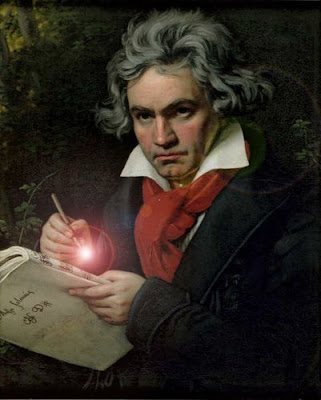 by Irena Schneider
by Irena Schneider"Roll Over Beethoven", sang Chuck Berry in 1956, heralding the era of rock, punk, psychedelic epiphanies, jolting closeness, and the unfettered emotional journeys of tragedy and self-discovery. Come mid-20th century, no longer did society confine itself in the prim and proper decency of the past, so long coated in the polish of culture, propriety, and all such delicately acquired tastes as Verdi's seasons or Degas' ballerinas.
Retrospectively, our high school years of history class have left images in our minds of people's revolutions against privileged upper classes, and we recall the rather demeaning self-importance of the world's monarchs and imperialists living in fleeting empires of gold and soft French-spoken indolence. Yet what was one culture's privilege was another's resentment, and the global demand for freedom, resonating from the voices of workers, serfs, peasants, and farmers was too loud not to be heard, uplifted, strung into the mainstream voice and perhaps, eventually, considered the superior of the voices in society.
Indeed, democracy has proven to be a highlight of human history. Culturally, however, when regarding old wisdom from the height of the 21st century, classical music, dances, literature, and art are becoming relics of history's unwelcome elite. From Victorian etiquette-styled waltzes and balls to the tango from the streets of Buenos Aires, the flappers of the twenties, the jitterbug, Armstrong's "cheek to cheek", to today's hip-hop, locking, grinding and spooning, social culture has extended away from black-tie elegance to the cries of the oppressed and restless in urban back-alleys and the angst-ridden minds of rebellious teens. They all want freedom; they want a cry of their injured sentiments to flare in the mainstream. All the while, each succeeding generation seeks more intimate physical, sexual, and emotional closeness, perhaps as a means of better understanding the human condition. Not surprisingly, it is the urgency for self-expression in the democratic world that catapults one generation's resentment towards another. Cultural rebellion, just like its political counterpart, is considered "cool." It is legitimized and paraded in disenchanted post-World War One literature, in the media-hyped '60s hippie revolution, in the cries of the civil rights movement, in James Joyce's Ulysses, and in many other similar movements.
The condemnation of racism, sexism, discrimination and the civilizing impulse to include all cultures and embrace all life-styles have been ever-present messages to a society that is steadily growing more self-conscious and inter-connected. The message infiltrates all our senses. At one moment, Dove's campaign for beauty is tearing down the long-held conceptions of established modeling; the next moment Katy Pary's "I Kissed a Girl and I Liked It" is stirring controversy about its appropriateness in the homosexual community, and the next moment the popular reality show So You Think You Can Dance crowns an untrained street performer as America's favorite dancer. The lights and flashes of open coexistence and the acceptance of movements long held underground seep through every media venue — TV, movies, radio, albums, blogs, personal videos, and even bumper stickers.
Ultimately, however, today's culture is only outwardly "open." Hip-hop, for instance, has followed the revolutionary path, moving from the street to the mainstream, and even to the pedestal of superior cultural music and dance. The past, meanwhile, is left in the dust. A teen in today's world interested in Mozart, Frank Sinatra, or impressionism (all formerly held in an elite cultural circle) is stereotypically deemed to be pretentious, a teacher's pet, someone who thinks he or she is just too smart for everyone else. The suggestion that a high school should host a '50s dance in today's world won't easily go down with the student government, which is merely being practical in suggesting that students would much rather be preoccupied with Soulja Boy.
We've come to view the past with the subtle resentment of our rebellious generation, which has, since its conception, fed from this sensory-loaded time — the ads, the TV programs, the music. All such media have shaped our liberal world view in the most democratic sense. Yet, for a second, we may look to the seemingly ancient conceptions of beauty and morality, and the elite culture of the past, like an old authority figure, spins on the back-burner, the "uncool" stigma yet attached.
"Roll over Beethoven," Mr. Berry demands. The question remains, though: What did Beethoven do to deserve such treatment?
(Graphic by TaranRampersad via Flickr, using a Creative Commons license. To see Chuck Berry perform "Roll Over Beethoven," please check below.)
culture
Beethoven
Chuck Berry
Add to Technorati Favorites



No comments:
Post a Comment